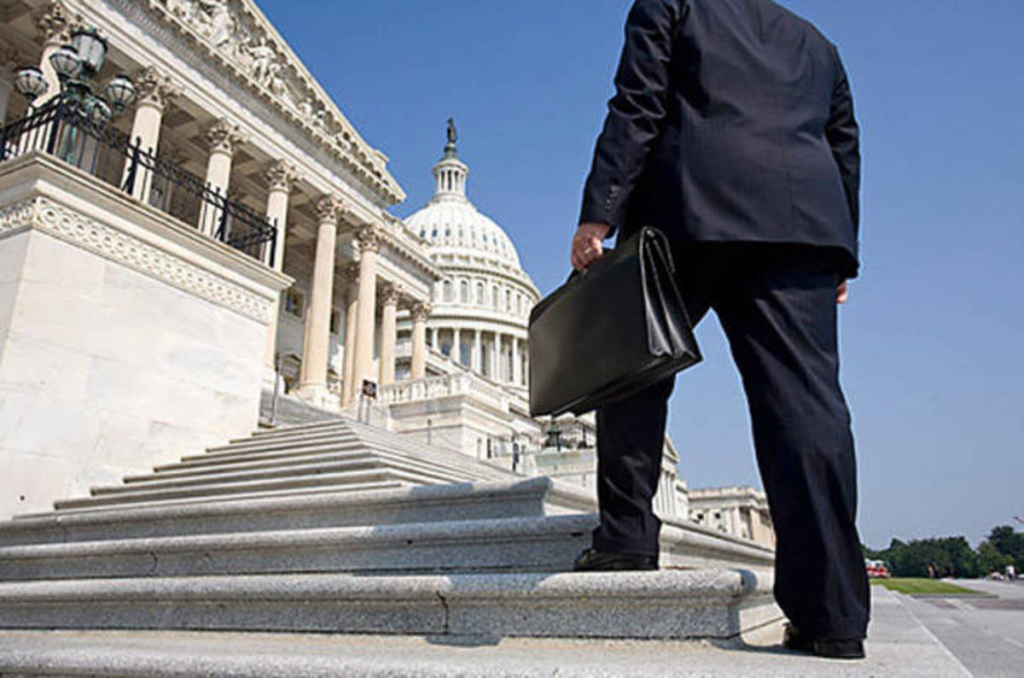The role of lobbyists in U.S. policy-making is a hotly debated issue. Some people believe lobbyists are helpful because they provide important information to lawmakers. Others argue that they give too much power to corporations and special interests, leaving everyday citizens behind.
Understanding what lobbyists do and how they influence government decisions is key to forming your own opinion. This article breaks down their role in simple terms and explores the impact of lobbying on democracy.
What Is a Lobbyist?
A lobbyist is someone who works to influence decisions made by government officials, especially lawmakers in Congress. Lobbyists usually represent a specific group, such as a company, union, or nonprofit organization. Their job is to make sure their clients’ interests are considered when new laws or policies are being discussed.
Lobbyists can work in many ways. Some are hired by professional lobbying firms, while others are employed directly by businesses, labor unions, or advocacy groups. They may meet with lawmakers, provide research and data, or even help draft parts of proposed laws.
Lobbying is legal in the United States and is protected by the First Amendment, which gives people the right to petition the government. However, there are rules. Lobbyists must register with the government and report who they work for and how much they spend.
A Short History of Lobbying in the U.S.
Lobbying has existed since the early days of the United States. The word “lobbyist” comes from the lobbies of government buildings, where people would wait to speak with lawmakers. Over time, lobbying became more formal and professional. Today, it is a large and powerful industry, especially in Washington, D.C.
While the right to petition the government is guaranteed, concerns about money and influence have led to regulations aimed at increasing transparency and preventing corruption.
How Lobbyists Influence Policy
Providing Information and Expertise
Members of Congress deal with hundreds of bills and issues, many of which are complex. Lobbyists often provide lawmakers with detailed information, research, and expert opinions to help them understand the potential effects of certain policies. For example, a health care lobbyist might explain how a new regulation would affect hospitals or insurance companies.
This can be helpful when used responsibly, as lawmakers may not have the time or background to understand every issue fully.
Helping Shape Legislation
Lobbyists often assist in writing or revising legislation. They might suggest specific language for a bill, propose changes, or advise lawmakers on legal or technical details. When a law is complex, this input can be useful. However, it can also lead to laws that favor specific industries or interest groups over the public good.
Campaign Contributions and Access
Although lobbyists can’t directly donate to political candidates, they often work closely with Political Action Committees (PACs) that do. They may also organize fundraising events. These financial relationships can give lobbyists more access to lawmakers, allowing them to make their case more effectively.
Critics argue this creates an unfair system where money buys influence, making it harder for everyday citizens to have their voices heard.
Who Hires Lobbyists?
A wide range of groups and individuals hire lobbyists to represent their interests. These include:
- Corporations such as oil companies, tech firms, and pharmaceutical businesses
- Labor unions representing teachers, nurses, or construction workers
- Nonprofit organizations focused on causes like civil rights, gun rights, or environmental protection
- State and local governments seeking federal funding or policy changes
- Foreign governments trying to influence U.S. trade or foreign policy
Lobbying is not limited to wealthy companies. Advocacy groups for patients, students, or veterans also hire lobbyists to make sure their concerns are heard.

Pros of Lobbying
Lobbying has several potential benefits:
Access to Knowledge
Lobbyists can provide detailed information and research that lawmakers might not have access to otherwise. This helps create better, more informed laws.
Representation for Many Groups
Lobbying allows many different voices to be heard. From small nonprofits to large businesses, lobbying can help groups advocate for their interests.
Competing Interests Can Balance Each Other
When multiple lobbyists represent different viewpoints, it can help lawmakers hear all sides of an issue. For example, both environmental groups and oil companies might lobby on climate policy, giving Congress a broader view of the debate.
Cons of Lobbying
Despite its benefits, lobbying also raises several concerns:
Unequal Influence
Not all groups can afford to hire professional lobbyists. Wealthy corporations often have more resources to influence lawmakers, which can lead to policies that favor the rich and powerful.
Corruption and Revolving Door
Many former lawmakers become lobbyists after leaving office. This “revolving door” creates potential conflicts of interest, as they may use their connections to gain special access for their clients.
Favoring Special Interests
Sometimes, laws are written in ways that benefit a specific industry or group rather than the public. This is known as regulatory capture and can weaken protections for workers, consumers, or the environment.
Real-World Examples of Lobbying
Lobbying has played a role in many major policy debates in recent years.
In the pharmaceutical industry, lobbyists have worked to prevent laws that would allow the government to negotiate lower drug prices. This has kept medication expensive for many Americans.
Gun rights groups such as the National Rifle Association (NRA) have used lobbying to block stricter gun control laws, even in the face of growing public support for change.
On the other hand, environmental organizations have successfully lobbied for laws promoting clean energy and climate action, showing that lobbying can also be used for public interest causes.
Regulations on Lobbying
The U.S. has passed several laws to regulate lobbying and promote transparency. These include:
- The Lobbying Disclosure Act, which requires lobbyists to register and report their activities
- The Honest Leadership and Open Government Act, which limits gifts to lawmakers and requires more detailed disclosures
- The Foreign Agents Registration Act, which monitors lobbying efforts by foreign governments
While these rules help improve accountability, critics argue that more reforms are needed to close loopholes and strengthen enforcement.
Possible Reforms and the Path Forward
Many people believe the lobbying system needs improvement. Some proposed reforms include:
- Banning the revolving door by preventing former lawmakers from lobbying for a certain number of years
- Limiting the amount of money that PACs can contribute to political campaigns
- Increasing transparency so that citizens can more easily track who is influencing which laws
Stronger reforms may help restore public trust and make the system more balanced and fair.
What Citizens Can Do
Lobbying may seem like something only corporations or insiders do, but ordinary people can influence policy too. Here are a few ways to get involved:
- Contact your representatives to share your opinions on issues
- Join advocacy organizations that support your values
- Vote in elections at all levels
- Stay informed about how policy decisions are made and who is influencing them
Active citizenship is a key part of a healthy democracy.
Conclusion
The role of lobbyists in U.S. policy-making is complicated. While lobbying can help lawmakers make informed decisions, it can also give too much power to wealthy and well-connected groups. Whether it helps or harms democracy depends on how it’s used—and how well it’s regulated.
Transparency, fair access, and civic engagement are essential to making lobbying work for everyone, not just a privileged few.
Do Follow USA Glory On Instagram
Read Next – Budgeting Strategy for Renters and Young Adults That Works






